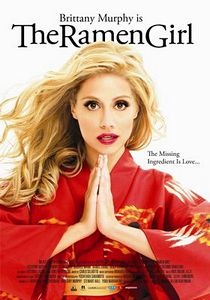 The Ramen Girl (2008) – on rental. Two more DVDs arrived by way of home rental near the weekend. One was the critically acclaimed psychological-sci-fi drama Moon from last year starring Sam Rockwell, and other the third Brittany Murphy drama in my queue and from 2008 – The Ramen Girl.
The Ramen Girl (2008) – on rental. Two more DVDs arrived by way of home rental near the weekend. One was the critically acclaimed psychological-sci-fi drama Moon from last year starring Sam Rockwell, and other the third Brittany Murphy drama in my queue and from 2008 – The Ramen Girl.
This Japanese-American production feels a lot like the other fish-out-of-water films of Westerners finding their way about in Japan, including Wasabi, Lost in Translation… heck, even The Last Samurai. Murphy stars as Abby, an American girl who’s just arrived in Tokyo to join her boyfriend, Ethan. Within the first 10 minutes or so, we find that Ethan didn’t really want Abby around, so he breaks up with her and takes off to Osaka for a business trip.
Distraught and in tears, Abby seeks solace in a Ramen restaurant that’s near her apartment. The restaurant is run by a headstrong and not terrifically pleasant Ramen chef Maezumi (Toshiyuki Nishida) with his wife Reiko (Kimiko Yo). And at the restaurant, Abby sees a vision of a Fortune Cat beckoning, as though suggesting that the Ramen restaurant is her destiny.
I’d coincidentally just re-watched Wasabi last week starring the always affable-on-screen Jean Reno, and couldn’t help referencing the 2001 film as I watched The Ramen Girl. Unlike the earlier film though, The Ramen Girl doesn’t take some of the same story short cuts – and I’m referring specifically to the all too convenient contrivances of Japanese somehow being able to speak beautiful English, and vice-versa. In The Ramen Girl, the Japanese leads – Maezumi and Reiko – and most of the supporting cast speak Japanese and don’t magically acquire an English language ability by the film’s end. The difficulties Abby experiences in understanding the locals persist through the film, which really adds to realism of the proceedings.

The pair of Japanese leads too discharge their roles well. I don’t follow Japanese productions, so both actors are unfamiliar to me. Maezumi is gruff at at his best, and an utterly tyrannical employer at his worst – and only at about the film’s last act does he somewhat soften up. So there’s some level of character development and progression from start to end for him. His bad cop role is a nice counterpoint to his good cop wife, Reiko, who’s sympathetic to Abby.
Funnily, it’s the Ramen references though that don’t work well. Early on, the film hints of the almost mystical effects of a perfect bowl of Ramen, with Abby willingly suffering from Maezumi’s Drill Sergeant antics only because she’ll do whatever it takes to learn from the master. However, the film never quite sees this important story element to its conclusion, apart from the suggestion that preparing a bowl of Ramen needs to come from one’s ‘spirit’ and not one’s ‘brains’ – whatever that means.
Even more disconcerting is that Abby is perpetually an emotional roller-coaster in the film. The story calls for strong reactions from her at each of the story’s major junctures – crying her eyes out at being dumped, disgust at the menial labor she has to do, frustration at being unable to cook the perfect bowl of Ramen, and joy when she finally does – and it gets tiresome. And it doesn’t help that Murphy displays little subtlety in each of these emo phases.
There’s also a bunch of supporting characters, a couple of them minor (like the two Japanese aunties who patronize the restaurant), but several of others which look like their parts would have some influence on the story’s progression but disappointingly don’t. Which leads you to wonder if their scenes were snipped to save time, or it was just sloppy writing on the script writer’s part.
So, it’s a mixed bag. It’s a watchable film if you’re interested in Ramen. Just don’t expect to watch this film expecting to experience some sort of epiphany on how they should be cooked.





Recent comments